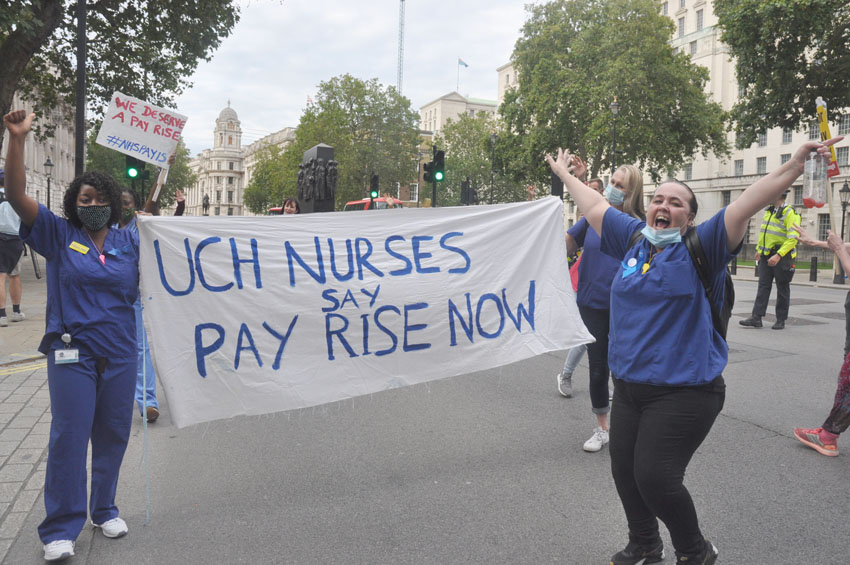A RECORD over 40,000 nurses have quit the NHS in the past year – one in nine of the workforce, an analysis by the Nuffield Trust think tank revealed.
It said many of these were often highly skilled and knowledgeable nurses with years more work left to give.
And the high number of leavers is nearly cancelling out the rise in new joiners that has been seen.
There were just 4,000 more joiners than leavers in the year to the end of June.
But a Department of Health and Social Care spokesman said progress was being made and the government was already halfway to meeting its target to increase the numbers of nurses working in the NHS in England during this Parliament by 50,000.
He said a workforce strategy would be published soon, setting out how the NHS will continue to recruit and retain nurses in the coming years.
But the Nuffield Trust said unless something was done to stem the rise in nurses leaving, the government could struggle to hit its target.
Dr Billy Palmer, from the think tank, said there was increasing evidence stress and work-life balance were becoming key factors in nurses’ decisions to quit.
He said while retirement was natural, it was ‘very concerning’ to see evidence these other factors becoming a major driver, suggesting there were ‘deep-rooted issues with working practices and employment conditions’.
‘Nurses are integral to the functioning of the health service – it should be an urgent wake-up call,’ he added.
The analysis also found the rest of the UK was facing similar problems.
The proportion of nurses quitting in Scotland was almost exactly the same and, while similar data is not available in Wales and Northern Ireland, other indicators suggest they are seeing significant numbers leaving.
Meanwhile, NHS managers are warning the situation could get worse as the cost-of-living crisis bites.
A report from NHS Providers which represents them said the squeeze on pay amid rising inflation is forcing nurses and other staff out of the health service or into making desperate decisions, including stopping contributions to their pension, skipping meals and taking on second jobs.
One in 10 nursing posts is vacant.
The Royal College of Nursing trade union has responded to analysis from the Nuffield Trust showing record numbers of nurses are quitting the NHS in England.
RCN General Secretary and Chief Executive, Pat Cullen, said: ‘Liz Truss must ask herself why record numbers are quitting a career they’ve loved. And, more importantly, tell us what her government will do about it.
‘We need the prime minister to show she’s grasped the urgency here. Nursing staff know that the care they give to patients is now too often unsafe.
‘Next week, nurses left working in the NHS will be voting on strike action and telling the prime minister that she must grip this situation – pay nursing fairly and give health and care services the investment the public expects.’
Meanwhile, energy prices will rise for millions of households today.
A typical annual bill will go up from £1,971 to £2,500 but will be partly mitigated by cost-of-living payments.
But prices will still be twice as high as last winter, and charities say that will leave many struggling.
The squeeze will be particularly acute for those on prepayment meters, who pay for energy as they use it, and so have largely been unable to smooth out increased bills over the year.
Adam Scorer, from charity National Energy Action said: ‘The most vulnerable, including children, will be cold and hungry as energy prices spiral, despite government support .
Every household pays for the energy it uses. There is no absolute cap on the total cost.
Under the Tory government’s two-year price guarantee, the average unit price for dual fuel customers paying by direct debit on variable deals will be limited to 34p per kilowatt hour (kWh) for electricity and 10.3p per kWh for gas.
With standing charges added, it means a typical household – one that uses 12,000 kWh (kilowatt hours) of gas a year, and 2,900 kWh of electricity a year – will not pay more than £2,500 a year for energy from today.
Last winter, the price cap – governed by the energy regulator Ofgem – meant the same typical household paid £1,277 a year.
That doubling of a typical energy bill is why millions of households have cut back on their energy use, according to a survey by the consumer group Which?
It suggested that 58 per cent of those asked reported reducing their usage of lights and appliances around the home. More than four in 10 said they had reduced hot water consumption, including taking fewer and shorter showers.
Given the wider context of rising prices, the consumer group also said that 60 per cent of those surveyed had bought cheaper food products than usual and 36 per cent had planned meals more, for example by batch cooking.
Which? has launched a campaign calling on supermarkets, telecoms and energy businesses to offer more support to customers facing financial difficulty, such as ensuring cheaper social broadband tariffs and value-range food is equally accessible to shoppers across the country.
Rocio Concha, its director of policy and advocacy at Which? said: ‘While government intervention is necessary, we also believe businesses across essential services can and should do more to help.
The government’s earlier package of cost-of-living payments is continuing.
The next stage begins from Saturday when everyone’s energy bill will eventually be cut by £400.
The discount will be for six months, with a reduction of £66 in October and November, and £67 between December and March 2023.
The discount will be made automatically by energy suppliers in England, Scotland and Wales, with plans for the equivalent to be paid in Northern Ireland.
